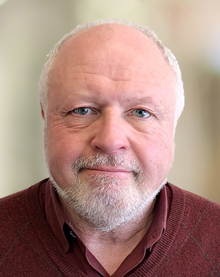Printed in the Winter 2023 issue of Quest magazine.
Citation: Smoley, Richard, "From the Editor’s Desk" Quest 111:1, pg 2
 Spooky action at a distance. Three times.
Spooky action at a distance. Three times.
Let me explain this cryptic utterance.
The first time: 1687. Sir Isaac Newton published his Principia Mathematica, which first set out his theory of gravity.
People had problems with this. The “mechanical philosophers”—followers of Descartes—objected to the concept of gravity because it set out a nonmechanical form of influence: the gravity of one body affected another even at a distance. Newton couldn’t explain the cause of gravity: he just posited it as a hypothesis, but it turned out to be one that worked very well.
The second time: the early twentieth century. Albert Einstein objected to quantum entanglement—the ability of objects to share a condition even though they are separated—as “spooky action from a distance.” He didn’t like quantum theory, which was at variance with his own theory of relativity. A coming Grand Unification Theory is supposed to harmonize these two theories. We’re still waiting for it.
The third time: now. As Mitch Horowitz ably explains in this issue’s article, psi research, conducted in countless experiments over the last 150 years, has proved the existence of such powers as clairvoyance, precognition, psychokinesis, and even retrocausation—the ability of an act in the future to affect one in the past. Yet the scientific community still resists these findings, and the gross biases of the media (I mean those read by the intelligentsia) leave the hapless public believing that science has refuted the existence of psi capacities. But the exact opposite is true.
In each case, the underlying problem is the same: skepticism about proven scientific findings because many thinkers cannot accept the idea that there can be a causal connection between two events that are not proximate in time or space.
The physicists never really found a mechanism to explain gravity, so they finally had to give in and posit it as one of the fundamental forces of the universe (to be understood later on—maybe). As for quantum theory, the Nobel Prize‒winning physicist Richard Feynman once remarked, “If you think you understand quantum mechanics, you don’t understand quantum mechanics.”
This takes us to the fundamental problem in science: causation. All of scientific theory is predicated on causation: the idea that one thing affects another in a consistent and predictable way. But there is nothing in human thought that is shakier than the concept of causation. As far back as 1913, the British philosopher Bertrand Russell wrote, “The law of causality, I believe, like much that passes muster among philosophers, is a relic of a bygone age, surviving, like the [British] monarchy, only because it is erroneously supposed to do no harm.” (For more about this, see my book The Dice Game of Shiva.)
One of the most influential treatments of causation was by the Scottish philosopher David Hume in the eighteenth century. Hume begins by saying that as he looks over the whole range of things that are called causes, he can find no one characteristic they have in common: being a cause is not a property like color or size or shape; the same is true of effects. He inferred that since being a cause or an effect is not an innate property, it is a matter of relation. “This relation,” he wrote, is “constant conjunction.”
Hume’s insight had a great effect on Immanuel Kant, who said that it wakened him from his “dogmatic slumber.” Kant developed his entire philosophy as a consequence. He said that causation (like certain other basic concepts such as identity, necessity, and negation) were not the inherent properties of objects in the world but merely “categories” by which we apprehend those objects.
Kant’s theories proved revolutionary in their own right. In any event, the problem of causation has never been solved: it may have no relation to the actual world “out there” but may simply be a way employed by the human mind to make sense of it.
Of course this puts large brackets around all scientific conclusions, which are based on the premise that one specific thing or event will inexorably lead to another. But nothing of the sort may actually be the case.
Furthermore, since causation is based on “constant conjunction,” scientists stumble over what appears to be remote causation, having difficulty believing that an object can influence another despite separation in time and space. Yet, as we have seen, science itself has proved—three times now—that this does occur. One more time, a narrow and inaccurate view of causation is impeding the progress of actual scientific findings.
Science has already stretched the limits of the human mind almost beyond capacity. When it comes to acknowledge the reality of psi phenomena, it will do so again.
Richard Smoley

